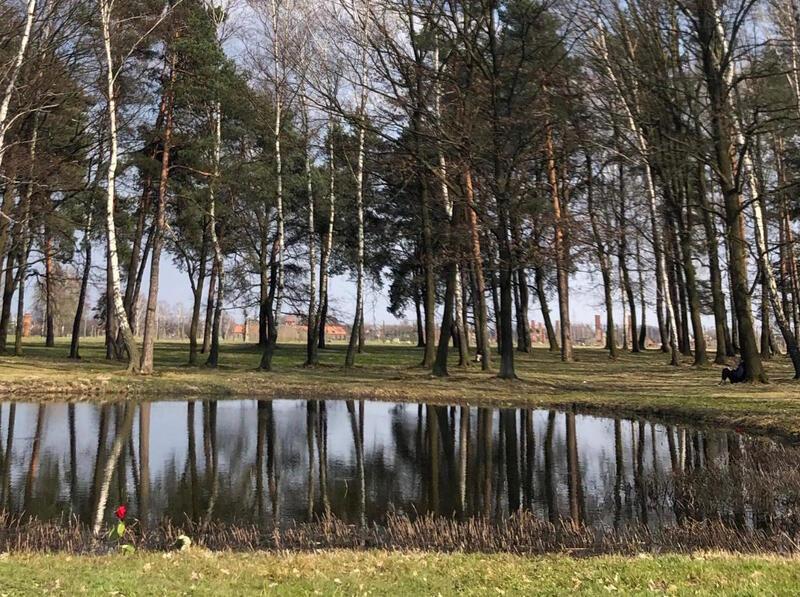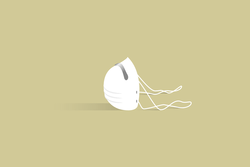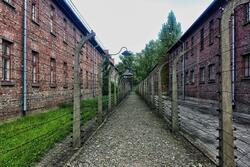Flowers At Auschwitz: The Power of Jewish Tradition and Hope
It was my seventh day in Poland. Every day prior to this one, I’d tried to prepare myself for the day we’d spend at Auschwitz. I’d been told that there were no words for the feeling you get while being there. I tried to get ready to walk through the train entrance with dark clouds filling the sky, to sit on wet dirt and feel the darkness of this place.
But the day I spent at Auschwitz-Birkenau ended up being completely different than I’d predicted: rather than the dark clouds and wet dirt I’d been expecting, the sun was shining and the grass was green. It felt as if someone had turned up the saturation and brightness on a colorless photo. Birds were chirping and trees were swaying.
My teacher told our class to find a seat on the grass and write about how we felt. With the sun beating on my back, I took a seat underneath the closest tree. I pulled out my leather journal and ballpoint pen, but there was no further movement of my body. I glanced at a pond a few feet in front of me and then back at my empty lined page. My body was numb, but my mind was racing. I didn’t know what to feel.
The pond was dark, almost black. I looked at the reflection of the sunlight on the opaque water. How could it be so bright in what must have been the darkest place on earth? How could I be sitting on living grass in a place of so much death?
My teacher told us that the pond had been a ditch full of ashes—the ashes of my ancestors. Over the years, water had collected and created this pond of darkness. Outlining the water, I noticed red flowers blossoming and wondered at how they had bloomed and grown around this water with such a disturbing past.
As I grappled with the fact that there was beauty in a place of such despair, I came to understand my surroundings differently. Through such heartache, these flowers spoke to me. I realized that, rather than a disturbing beauty, these flowers might represent a glimpse of hope. These flowers blossomed out of strength, a strength the Jewish people have had for centuries. A strength I have because of my Judaism.
In my own life, I have maintained my hope for the Jewish future by upholding traditions that are important to me. At home in Berkeley, California, most of my friends aren’t Jewish. When I was in elementary school, my ima (mom) would come to my school with dreidels and latkes to teach my classmates about Hanukkah every winter. For many, this was their first time hearing about the holiday. As one of the only Jewish kids at my school, I felt honored to be the one to educate my class about Judaism, the biggest part of my identity.
I would stand in the front of my class, holding my ima’s hand, excitement and energy radiating from my body. I would chime in and help my mom tell the story of Hanukkah and teach my classmates the game of dreidel. Each year, my mom took the day off from work to come to my classroom, latkes in hand, instilling a love and understanding for Judaism both in me and in my classmates. Even through the simple act of teaching elementary school kids how to play dreidel, my mom made a conscious decision to share these traditions with others, especially those who don’t practice them. By doing this, my mom expanded these traditions.
When I got too old to have my mom come to my classes, I decided to carry on her tradition of sharing our traditions. Every Shabbat, I invited a friend over to light candles and eat challah. To this day, my non-Jewish friends are able to sing the Shabbat prayers with my family. Hearing them bless the challah gives me hope that our tradition will carry on and be shared not only with the Jewish people, but with people of all faiths.
While I’ve always had a deeply-rooted sense of responsibility to carry on my Jewish traditions, I never quite understood why I felt this way. At Auschwitz, I realized how much tradition has not only brought hope to the Jewish people, but how much hope it brings me. The simple image of a beautiful flower growing in Auschwitz reminded me of the strength and power that hope can carry.
This piece was written as part of JWA’s Rising Voices Fellowship.








Dahlia, I was very moved by your essay. Last night at a family Shabbot, I read it aloud. Everyone commented on your perspective and feeling of hope. Thank you for sharing. Amy
This was such a moving and beautiful piece. I loved all of the layers and dimension to it, it really demonstrated the nuance and complexity of the religious experience. I've always admired our resilience, as the Jewish community, but have never been able to put it into words, and you were able to do so in such a moving way. Jewish history can be so, so dark, but at times we have to look beyond that and admire the beauty that came from such unique coping practices. This line really spoke to me: "I realized that, rather than a disturbing beauty, these flowers might represent a glimpse of hope. These flowers blossomed out of strength, a strength the Jewish people have had for centuries. A strength I have because of my Judaism."
Wonderful piece!
-Shoshie
What a very well written and moving essay. Thank you for sharing it with me. I would like to share it with my parents.
Thank you! This was beautifully written and very powerful.
Dahlia, this was such a chilling yet wonderful read. The juxtaposition between the beauty of nature during your day at Auschwitz and the horrific history really amplified your message of how both our past and hope can give us the power to embrace our cultures.
My heart is swelling!
I'm a client of your ima. This a lovely article. Thanks for letting your mother share it.